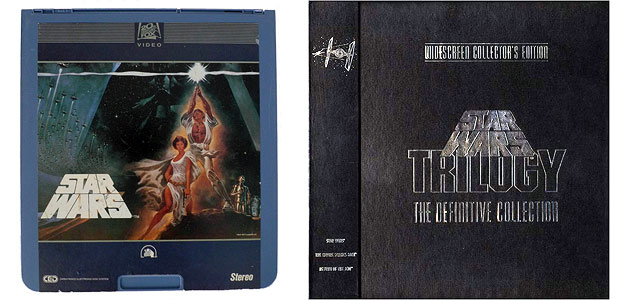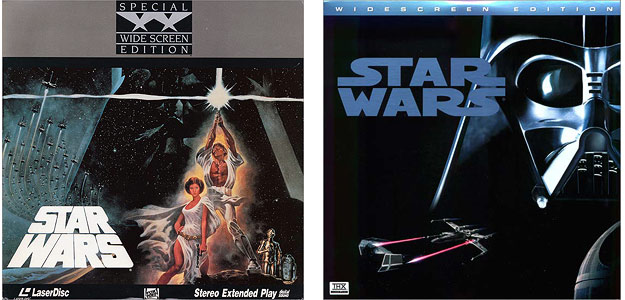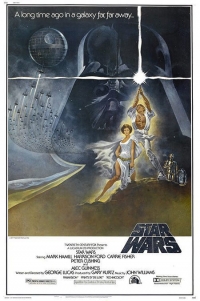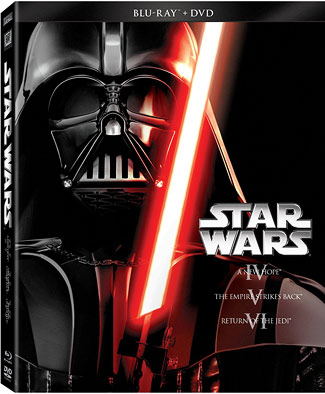THE Q&A
Marcus Hearn is the author of The Cinema of George Lucas (2005, Abrams). He also wrote Star Wars: Attack of the Clones—The Illustrated Companion (2002, Ebury) and Doctor Who: The Vault—Treasures from the First 50 Years (2013, Harper Design).
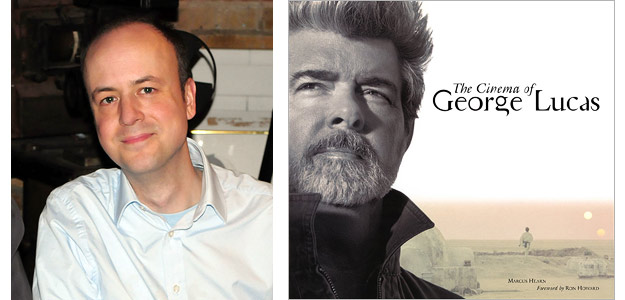
Patrick Read Johnson is the writer and director of 5-25-77. Patrick was the first civilian to see Star Wars during a visit to Industrial Light and Magic in early 1977 while the film was still in production. His other films include Spaced Invaders, Baby’s Day Out, and Angus, and he was the co-writer of DragonHeart. Patrick currently teaches directing at the University of North Carolina School of the Arts.
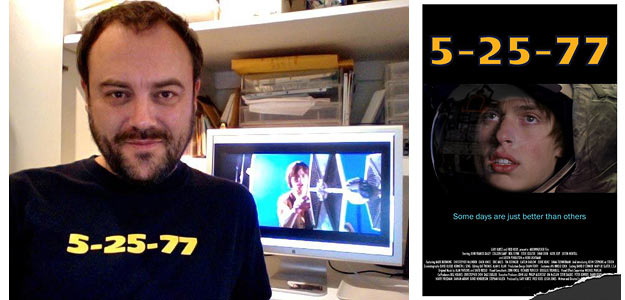
Charles de Lauzirika produced the Star Wars: Launch Bay featurette now playing at both Disneyland in Anaheim and Disney’s Hollywood Studios in Orlando, which explores the past, present and future of the Star Wars franchise. Charles is an acclaimed film documentarian and DVD/Blu-ray producer with over 100 credits, including such essential home video box sets as Blade Runner, Twin Peaks, Prometheus and the Alien Anthology. His feature directorial debut Crave, starring Ron Perlman, was released in 2013, and won multiple awards at festivals around the world.
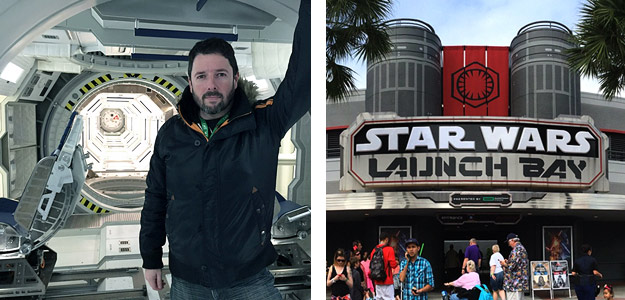
Kevin Rubio is the director and co-writer of Troops, the acclaimed “Cops Meets Star Wars“ parody that was at the forefront of the fan film movement. Kevin is the creative director at Synaptic VFX Studios and has written for such TV series as Star Wars: The Clone Wars, Thunderbirds Are Go!, and Ben 10: Omniverse. He is an honorary member of the 501st Legion.
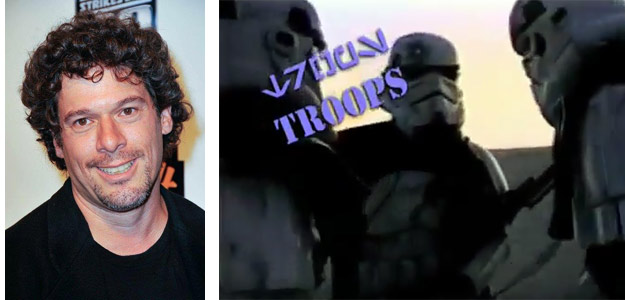
The interviews were conducted separately and have been edited into a “roundtable“ conversation format.
---
Michael Coate (The Digital Bits): To what do you attribute the enduring appeal of Star Wars? Why has the original movie and subsequent franchise been such a force to be reckoned with?
Marcus Hearn: Star Wars is one of those very rare films that established new parameters for film entertainment. Dr. No is another. The impact of both those films is still being felt today.
Patrick Read Johnson: Star Wars arrived on the scene at a time when America was still reeling from the end of the Vietnam War—the first war we ever lost—and the staggering loss of respect for our political leadership, both for that disaster and the disgrace of Watergate. Add to the mix the idea that ours was the first generation of kids who were dealing with the incredible post-60s explosion of divorce and you had the makings of an adolescent malaise for which Star Wars was the perfect cure. Curled up in our seats in movie theaters showing Star Wars, we could WIN again… we could trust the wisdom of our often perplexing but somehow comforting Grandparents, (who’d won World War II no less!) to guide us past the mistakes made by the promise-breaking parents who’d torn our families apart…. Just like American Graffiti, Star Wars was really about US. And, just like the films some of us were making in our back yards, it had the feeling that it had been made out of things you could find lying around your garage. And that the younger characters were being played by the same people in the drama club at your high school.
Charles de Lauzirika: I think the way people respond to Star Wars has evolved over the years, but at its core remains a very strong morality tale that combines timeless themes with new technology in a unique way that no other franchise has quite equaled, and many have tried. The Original Trilogy in particular, offers us a vibrant family of characters who are not only relatable but also, in many ways, inspirational. I feel like most people want their own existence to have larger-than-life meaning. They want to be on an epic quest like Luke Skywalker, or enjoy the thrills and fun of being Han Solo, or shine as a positive beacon of leadership like Princess Leia. I find that in life, you want to surround yourself with friends who inspire and encourage you to be better than you are. In their own space opera way, the central characters of the Original Trilogy did just that. And the cosmic sense of destiny that urged those characters forward made the whole thing sing…. There was also the amazing world-building George Lucas and his design team achieved. At no time watching Star Wars did I ever—or do I ever—imagine the crew behind the camera. I don’t see Tunisia, circa 1976. I see Tatooine, circa a long time ago in a galaxy far, far away. Always. What I love about Ralph McQuarrie’s conceptual art, for example, is the way that the corridors and doorways in his backgrounds tease you with just a tiny glimpse of what’s through that portal or what’s in the next room. It’s that sense of a completely realized universe existing outside the edges of the frame or beyond the focus of the plot, all combined with highly compelling characters and adventures, and an almost religious communal experience for audiences all over the world, that makes Star Wars such a powerful fantasy for the human imagination to enjoy and revisit time and time again.
Kevin Rubio: Star Wars’ popularity endures due to many factors. The first being timing. The country had been through the hell of the late 60s, the Vietnam War and Watergate. The studio system had collapsed the auteurs and the new wave of kids who had been influenced by European cinema were turning out great works, but mostly serious works—The French Connection, The Conversation, Dog Day Afternoon, Taxi Driver. Star Wars was above all, a fun movie experience, and the country needed that…. Its look is also timeless. It’s not set in any particular period. It has elements of both nostalgia and futurism, even today and does not date itself like other sci-fi of its time. Its basic story is also timeless and simple—good vs evil, fathers and sons…. Those two points propel a franchise and merchandising that cannot be ignored in today’s culture. It has found a permanent place in the zeitgeist, and will probably endure long after you and I have shuffled off this mortal coil.
Coate: Describe the first time you saw Star Wars?
Hearn: I saw the first Star Wars in early 1978, when it went on general release in the United Kingdom. I was seven years old. I sat in the balcony of our local cinema with my father, and what I saw literally amazed me. It was the first time I’d ever been to the cinema. The only down side was that I wrongly assumed all subsequent cinema experiences would be that thrilling.
Johnson: I don’t want to spoil my film’s plot, but I can tell you that the first time I saw Star Wars was several months before it was finished. And that despite it having a great many un-composited blue-screen shots, no sound effects or music, and World War II footage and shots from 633 Squadron and Dam Busters still cut into the Death Star attack sequence, it was the most jaw-dropping thing I’d seen since 2001: A Space Odyssey…. The story of how and when I first saw the actual theatrical release is also spoiler material. All I can say is that, within the first few minutes of the film, I knew I would soon be getting into my Ford Pinto and driving from Wadsworth, Illinois (population 750) to Los Angeles. And that I wouldn’t be coming back until I was somehow a part of the kind of fun being had by the lucky people who’d had a chance to make this amazing film.
Lauzirika: My dad took me to see it opening day at the Chinese Theater in Hollywood. I was nine years old, and thanks to my love of Jaws, already a fledgling movie fanatic. I have fleeting but specific memories of that day. I remember already sort of innately knowing what Star Wars was, even though I hadn’t seen it yet. It just felt like something I had already been in love with since the beginning of time. But I remember looking at the lobby cards on display in the Chinese courtyard and imagining how those moments might play out in the film itself. For example, that high angle image looking down on Chewie walking behind Luke and Han at the medal ceremony. For some reason, not having seen the film yet, and given the stern formality of everyone in the photo, I mistakenly assumed that Chewie was an enemy who had captured Luke and Han as his prisoners, and was taking them to his supreme leader in some alien castle. Obviously, I was very, very wrong in regards to how that scene would ultimately play out, but it just goes to show how Star Wars inspires you to engage with the material and dream up your own stories…. But like most other kids, I sat there in the dark and had my mind blown on a profoundly deep level when the first notes of John Williams’ score accompanied the opening title and crawl. From the very beginning, Star Wars commanded your attention and never ever let go. Almost immediately, you just knew you were witnessing something that was more than just merely game-changing. It worked on a deeper, more primal level than that. So by the time you realized that the Star Destroyer rumbling over your head was the biggest thing you had ever seen—and it was still going!—you had already given yourself over to this universe mere seconds into the film. You surrender yourself to a grand narrative that touches you on almost a spiritual level. I think that’s why many people stick with Star Wars through thick and thin. You’re always rooting for it, you’re always hoping for the best, and you’ll always show up to see a new Star Wars movie, no matter what you thought of the last one. And it was with that intense love—that religion—that I left the Chinese Theater on May 25th, 1977 a changed little boy.
Rubio: It was the Century Theaters (like Hollywood’s Cinerama Dome) in San Jose, California. The only thing I remember is my father remarking how the line was longer than the one for The Exorcist.
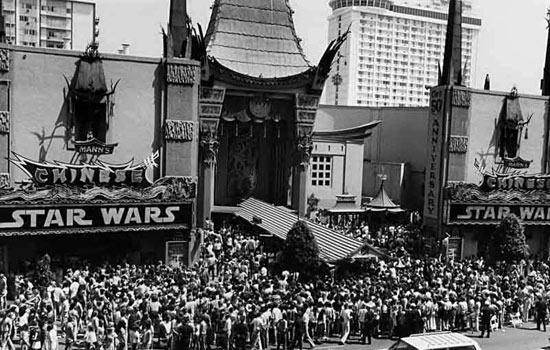
Coate: Where does the original movie rank among the entire franchise?
Hearn: The original movie is the best. It’s beautifully realized, supremely self-confident, and the story is self-contained.
Johnson: It is, ultimately, [the best] because it’s the DNA for all that’s come after. And the audacity and exuberance of its cast and crew were growth hormones that made it all thrive. The first film is absolutely alchemical. And, even Empire, for all its amazing craft and maturity, is still just very healthy fruit picked from the tree of Star Wars.
Lauzirika: In regards to its original theatrical version, Star Wars has only gotten better with age, in my opinion. I have to admit that like a huge number of fans, I consider Empire to be the best entry in the Saga so far, mostly because it feels more daring, sophisticated and thrilling to me than the others. It’s funny, scary and bittersweet. But the organic purity and joy of Star Wars cannot be ignored. I watched it again recently and even now, after 38 years and who knows how many repeat viewings, I’m just flabbergasted by how endlessly inventive and entertaining it is. Not just in terms of effects or design, but also in terms of iconic moments and brilliant character building. I mean, every scene has at least one element we had never seen before, and not only were those elements new and original, they were also impossibly cool. There was a new “whoa!” moment every few shots. I think that’s why toy and merchandise sales took off so spectacularly. It was a way to transport yourself to that universe and immerse yourself in a reality that hadn’t existed in that particular way before. I spent the Summer of ’77 just drawing and writing, reading books and listening to music, and doing anything creative I could to fuel the explosion of imagination that Star Wars caused in my young mind…. Also in its favor, Star Wars tells a completely self-contained story. If that had been the first and final story taking place in this universe, it would still be entirely satisfying. The films that followed all had their own unique impact on not just the franchise but also worldwide pop culture in general. Yet nothing will ever compare to that first Summer of Star Wars. If young people today think Star Wars is everywhere now with all of the pre-release excitement for The Force Awakens, they should have been there in 1977 when the original film literally changed the world and inspired a whole generation of kids to become creative in ways they hadn’t even known was possible before.
Rubio: It waffles between number one and number two, depending on what week you catch me.
Coate: Why has Star Wars lent itself so well to homage and parody?
Hearn: I don’t know, but I think it’s worth mentioning that the vast majority of those homages are highly affectionate.
Johnson: Because IT is already a “dramatic parody” of our most basic human struggles set in a kind of wonderfully preposterous sci-fi universe. And since we so uncynically, and sometimes embarrassingly, gave ourselves up to loving it, for addressing our wounds, with such unbridled silliness, we are relieved and delighted to see IT made fun of, instead of US!
Lauzirika: Nearly every single thing about Star Wars is iconic and instantly recognizable. Comedy is based on things people can relate to. Most people can relate to Star Wars, or at least identify the meaning of the joke being told. Look at the scene in Ferris Bueller’s Day Off when the valet guys take the vintage Ferrari out for a Star Destroyer-style joy ride. I bet even if you hadn’t seen a single Star Wars film, you would have laughed at it instinctively simply though pop culture osmosis. But having seen Star Wars, you get it. You’re in on the joke. And you appreciate that John Hughes was a geek too. It’s an inclusive experience. Plus, as the years roll on, nostalgia becomes more of a factor. I know one reason a lot of people loved Guardians of the Galaxy—as I did—was because it felt so wonderfully Star Wars-y. It was a particular flavor of pulpy science-fantasy filmmaking we hadn’t really seen to that degree since Jedi. So you feel like you’re in good hands, taking part in entertainment that speaks to you, being made by people who share your tastes. And that connection is largely based on there being so many immediately identifiable elements that people almost fetishistically enjoy from the Star Wars films.
Rubio: Because George Lucas allowed it. Hands down the biggest reason. If it had always been owned by Disney, you never would have seen all those fan films. Don’t believe me? Google “Disney sues kindergarten.” A list will pop up before you finish typing “k-i-n.” But here; I’ll save you the trouble: http://www.snopes.com/disney/wdco/daycare.asp
Coate: Episode VII: The Force Awakens. Your thoughts and expectations….
Hearn: I’m open-minded and optimistic. I imagine I’ll see it in January, once the rush is over!
Johnson: I believe it’s POSSIBLE that Kathleen Kennedy and J.J. Abrams may just be about to deliver the most exciting, visually thrilling, and best of all, most MOVING Star Wars film EVER.
Lauzirika: By the time this article runs, I will already have seen it at an early screening. But right now, I feel like a kid on the biggest Christmas Eve ever. And yet, I’m also keeping my expectations grounded. I think that’s a healthy place to be. Much like with the previous six films, I feel like I’ll know within just a couple minutes whether I’m fully on board or not. At minimum, I just hope The Force Awakens breathes new life into the story and characters, allowing for this universe to continue on and that more independent filmmakers from a variety of backgrounds get a chance to play in this massive sandbox. That’s why I’m also so excited for the A Star Wars Story standalone films like Rogue One. The possibilities are endless. But for now, it will just be thrilling to see a new chapter in the Star Wars Saga—a chapter I don’t think many of us ever believed we’d actually live to see happen. And yet here we are, only a few days away.
Rubio: Cautiously optimistic.
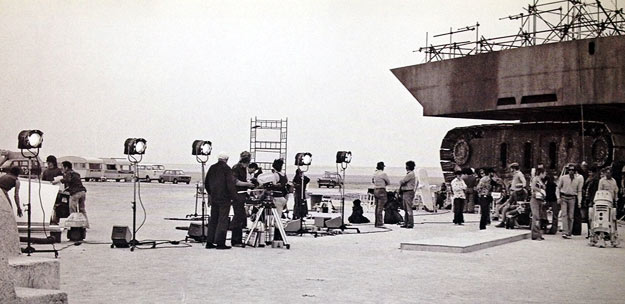
Coate: What is the legacy of Star Wars?
Hearn: The impact on the mechanics of filmmaking and the marketing of films, as well as the themes of big budget productions, is immeasurable.
Johnson: Hope.
Lauzirika: Star Wars was and continues to be revolutionary in any number of ways. It revolutionized storytelling. It revolutionized filmmaking. It revolutionized business. It revolutionized pop culture. It has impacted religion, politics, music, design, fashion, communication and human behavior. Just look at any kid who picks up a stick and instinctively starts waving it around, making lightsaber sounds with their mouth. And yet, if you really take a step back and look at its origins, all of that innovation and inspiration came from George Lucas looking back into history, identifying common stories important to the human journey, and then turbo-charging that research with a kind of technological magic no one was prepared for. And it’s all there in the opening legend. “A long time ago in a galaxy far, far away….”—Lucas and his inner circle of collaborators were taking the myths of yesterday and fusing them with the technology of tomorrow in a way that had never been done before, all at a critical time in history when millions of people around the world were desperate for inspiration and escapism. I’ve spoken to many people who worked on the original Star Wars films and almost of all of them agree that while they knew they were making a fun popcorn movie, none of them had any idea they were helping create a global phenomenon. I think we’re again at a crossroads in history where a simple, thrilling tale of good vs. evil can inspire us and help us deal with the sobering reality unfolding around us. Yes, the Star Wars franchise is, at its foundation, simple entertainment. But for people around the world who find inspiration and endless enjoyment in it, they know it’s capable of something far more profound. It’s an ongoing multi-generational experience that brings people together and encourages them to dream. And I’m not just talking about becoming a filmmaker. I’m talking about anyone from any walk of life who looks at Luke Skywalker gazing upon that binary sunset and recognizes themselves in that moment, longing to be a better person and taking their first step into a larger world.
Rubio: There are only two people who have ever completely changes the face of cinema—Thomas Edison (what a prick) and George Lucas…. Star Wars is the cinematic equivalent of B.C.E. to A.D. The film industry, in all its facets, was forever changed from the top down. Marketing, merchandising, franchising, distribution, production, post production, the film viewing experience—all of this is because one man wanted to make the images in his head appear exactly like his vision, but on screen. So now you have digital instead of film, Adobe Premiere instead of splicers, Dolby Atmos and THX instead of optical tracks, The Avengers instead of He-Man and the Masters of the Universe…. Photoshop, Pixar, Jurassic Park, AVID, digital projection, CGI, THX, you have all this because one man had enough drive and cash to say, “We’re going over here where it isn’t safe, and I don’t really give a f**k what you think, or if it’s impossible.” Do you think a studio wants to experiment? Spend money when they don’t have to? Change the status quo? THAT’S what George has done, and Star Wars made that possible.
Coate: Thank you, Marcus, Patrick, Charles, and Kevin, for participating and for sharing your thoughts on Star Wars on the eve of the release of The Force Awakens.
--END--
IMAGES
Selected images copyright/courtesy Lucasfilm Ltd./20th Century Fox/Disney/San Francisco Chronicle
SOURCES/REFERENCES
The primary references for this project were regional newspaper coverage and film reviews, and trade reports published in the periodicals Boxoffice, The Hollywood Reporter and Variety. Other periodicals referenced included Newsweek, Time and Widescreen Review. Film industry documents referenced included Dolby Stereo installation records, circa 1977-78. Books referenced included George Lucas’s Blockbusting: A Decade-By-Decade Survey of Timeless Movies Including Untold Secrets of their Financial and Cultural Success edited by Alex Ben Block and Lucy Autrey Wilson (2010, George Lucas Books/HarperCollins), The Hollywood Reporter Book of Box Office Hits by Susan Sackett (1996, Billboard), The Making of Star Wars by Jonathan Rinzler (2007, Ballantine/Del Rey), The Movie Business Book edited by Jason E. Squire (1983, Fireside), and Skywalking: The Life and Films of George Lucas by Dale Pollack (1983, Harmony). Websites referenced include BoxOfficeMojo, CinemaTour, CinemaTreasures, FromScriptToDVD, and In70mm.
SPECIAL THANKS
Brad Adams, Laura Baas, Jim Barg, Mike Blakesley, Louis Bornwasser, Michelle Burkhart, Raymond Caple, John Cork, Nick DiMaggio, Laura Fazekas, Monte Fullmer, Thomas Hauerslev, Sheldon Hall, John Hazelton, Bobby Henderson, Mike Hensley, Jeffry Johnson, Bill Kretzel, Ronald A. Lee, Mark Lensenmayer, Paul Linfesty, Adam Martin, Scott Neff, Jim Perry, Patricia Poland, Tom Procyk, Tim Reed, Jarrod Roll, Melissa Scroggins, Desiree Sharland, Darryl Spicer, Allen Swords, Ricky Watson, Joel Weide, Vince Young, and a huge thank-you to all of the librarians who assisted with the research for this project.
-Michael Coate
